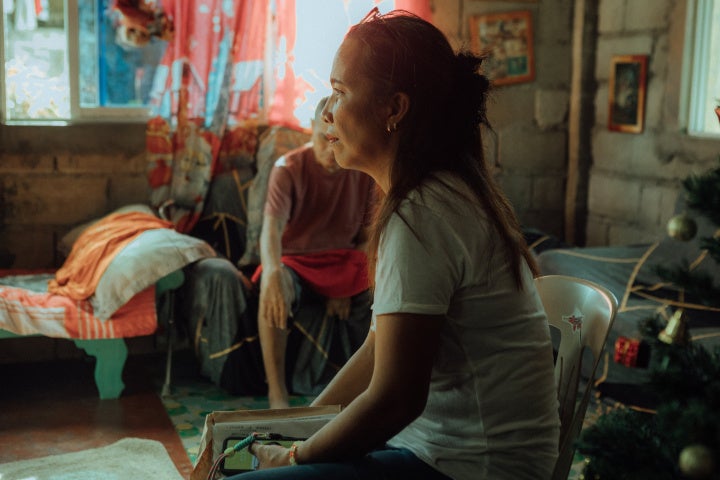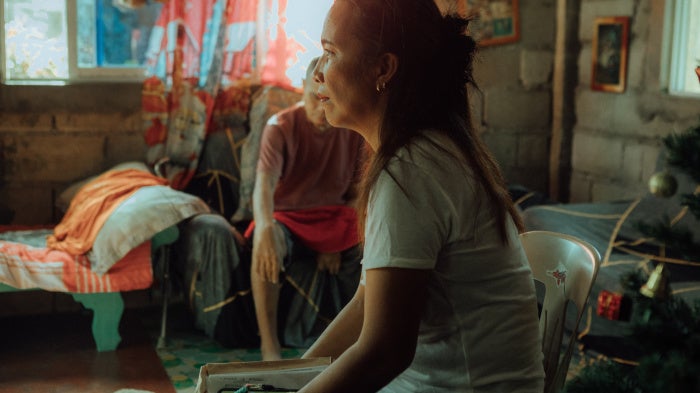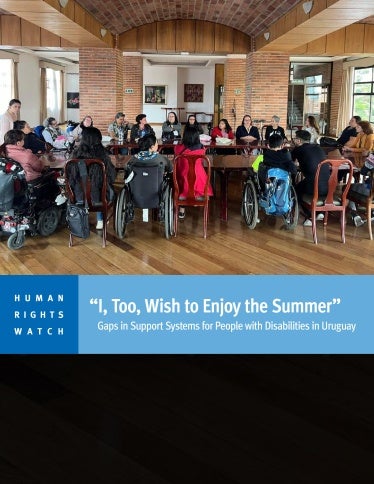After the Storm
A new web feature looks at climate change, planned relocation, and people with disabilities in Siargao, Philippines.


A new web feature looks at climate change, planned relocation, and people with disabilities in Siargao, Philippines.


The 40-page report, “‘It Felt Like Everything in Life Stopped’: Legal Capacity Rights Violations Against People with Disabilities in Canada’s Immigration Detention System,” documents how the country’s use of designated representatives undermines the rights of immigration detainees with disabilities to make their own decisions, often with life-altering or even life-endangering consequences. Designated representatives are appointed by the Immigration and Refugee Board when it deems that a detained person is “unable to appreciate the nature of the proceedings.”

The 77-page report, “Unchecked Injustice: Kenya’s Suppression of the 2023 Protests,” documents that the police, under President William Ruto’s administration, committed grave rights abuses in response to largely peaceful opposition-led nationwide protests. The demonstrations were triggered by the high cost of living and alleged electoral malpractices following the August 2022 general elections.


The 95-page report, “The Man Who Bought The World: Rights Abuses Linked to Saudi Arabia’s Public Investment Fund and Its Chairman, Mohammad bin Salman,” found that Saudi Arabia’s vast fossil fuel-derived state wealth is effectively controlled by one person, Crown Prince Mohammed bin Salman. Human Rights Watch found that the crown prince wields this enormous economic power in a largely arbitrary and highly personalized manner rather than for the Saudi people’s benefit and that the PIF is used to whitewash the Saudi government’s abuses.

The 154-page report, “‘Hopeless, Starving, and Besieged’: Israel’s Forced Displacement of Palestinians in Gaza,” examines how Israeli authorities’ conduct has led to the displacement of over 90 percent of the population of Gaza—1.9 million Palestinians—and the widespread destruction of much of Gaza over the last 13 months. Israeli forces have carried out deliberate, controlled demolitions of homes and civilian infrastructure, including in areas where they have apparent aims of creating “buffer zones” and security “corridors,” from which Palestinians are likely to be permanently displaced. Contrary to claims by Israeli officials, their actions do not comply with the laws of war.

The 70-page report, “‘It’s Like I live in a Cage’: Turkmen Authorities’ Denial of Passports to Turkmen Citizens in Türkiye,” describes Turkmenistan’s refusal to renew passports outside of the country as part of the government’s broader effort to severely restrict freedom of movement within its wider system of repression. The groups documented the hardships and interference with rights that Turkmen migrants in Türkiye experience in their daily lives when they become undocumented as a result of Turkmen authorities refusing to provide passport renewal services. Those who openly criticize or in the past have criticized the Turkmen government are at serious risk of deportation to Turkmenistan, where they face extreme repression, arbitrary arrest and imprisonment, and risk of torture.

The 28-page report, “Beyond Burning: The Ripple Effects of Incendiary Weapons and Increasing Calls for International Action,” examines recent use of incendiary weapons in armed conflicts and their wide-ranging impacts. Human Rights Watch presents case studies of the Israeli military’s use of white phosphorous—a weapon with incendiary effects—in the Gaza Strip and Lebanon since October 2023, and the use in Ukraine and Syria of other types of incendiary weapons. Human Rights Watch also details the growing interest of many countries in addressing the multiple humanitarian concerns raised by incendiary weapons.

The 62-page report, “Witness, Ally, Advocate, Climate Worker: Doula Care for Justice in Maternal Health in Florida,” found that the state provides inadequate financial and programmatic support for doula care, including under state-based Medicaid plans on which almost half of all women who are pregnant or give birth in the state rely. Doulas are non-clinical health workers who provide expert support during birth and provide individualized information about health care options, rights, and resources. Academic and US government research suggests that doula services can help improve the availability, accessibility, and quality of health care services for pregnant people. One multi-country analysis of evidence found continuous labor support by doulas may reduce rates of cesarean delivery and improve Apgar scores (indications of good health in newborns) and women’s ratings of the experience.

The 22-page report, “‘They Threw Me in the Water and Beat Me’: The Need for Accountability for Torture in Rwanda,” documents torture and ill-treatment by prison officials and detainees in Nyarugenge prison in the capital, Kigali; in Rubavu prison, western Rwanda; and in an unofficial detention facility in Kigali known as Kwa Gacinya. Human Rights Watch found that judges ignored complaints from current and former detainees about the unlawful detention and ill-treatment, creating an environment of near-total impunity.

The 26-page report, “Double Betrayal: Abuses against Afghan Policewomen Past and Present,” documents threats from Taliban authorities since August 2021 that have forced many former policewomen to go into hiding out of fear of being identified.


The 74-page report, “‘We Try to Stay Invisible’: Azerbaijan's Escalating Crackdown on Critics and Civil Society,” documents the government’s concerted efforts to decimate civil society and silence its critics. The authorities have arrested dozens of people on politically motivated, bogus criminal charges. They have also arbitrarily enforced repressive laws that push independent groups and media to the margins of the law, heightening their vulnerability to retaliatory criminal prosecution. The groups documented 33 prominent cases of criminal prosecution, detention, and harassment. They found that Azerbaijani authorities have deliberately misused laws regulating nongovernmental organizations (NGOs) to deny certain groups registration and funding, exposing people affiliated with them to criminal charges.

The 83-page report, “‘They Destroyed What Was Inside Us’: Children with Disabilities Amid Israel’s Attacks on Gaza,” documents that children who have acquired a disability and children who already had a disability in Gaza face a precarious security situation and additional difficulties as they struggle to comply with frequent Israeli army evacuation orders and a lack of effective advance warning of attacks. The ongoing siege of Gaza, the unlawful obstruction of humanitarian aid, the use of starvation as a weapon of war, and damage and destruction of hospitals cause disproportionate harm to children with disabilities, who struggle to access desperately needed medical treatment and supplies, assistive devices, food, and water. They are at particular risk of lasting psychological harm.

The 50-page report, “I, Too, Wish to Enjoy the Summer”: Gaps in Support Systems for People with Disabilities in Uruguay, documents Uruguay’s shortcomings in meeting the support requirements under its National Integrated Care System for everyone with a disability. Many are ineligible for the care system’s Personal Assistants Program due to their age, income, or how “severe” their disability is. People with certain types of disabilities, like intellectual and sensory disabilities, and those with high-support requirements, are effectively excluded from the program because personal assistants are not trained to support them. Human Rights Watch found that Uruguay has not sufficiently involved organizations of people with disabilities in the design, administration, and monitoring of personal assistance under the care system, resulting in its failure to recognize users as rights-holders and its delivery of inadequate, limited services.

The 76-page report, “‘We Can’t Write the Truth Anymore’: Academic Freedom in Hong Kong Under the National Security Law,” documents that long-protected civil liberties, including the rights to freedom of expression, assembly, and association, have been under assault in Hong Kong’s eight publicly funded universities. As these universities have become increasingly repressive, students and faculty widely self-censor, fearful of being targeted for harassment, retribution, and even prosecution for what they say and do both in the classroom and on campus.
